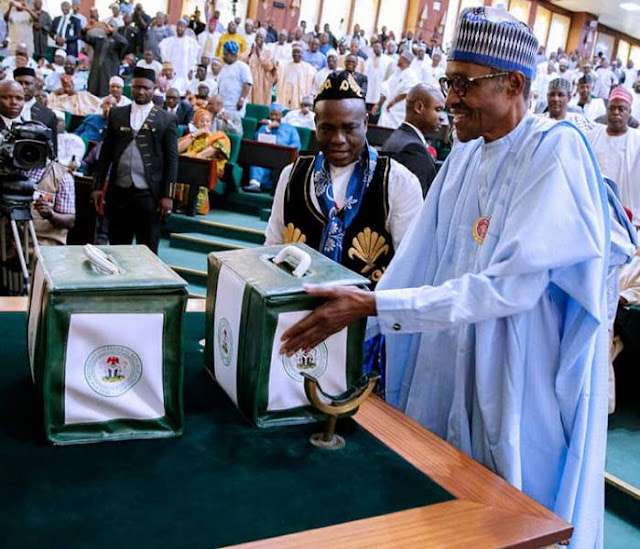BUDGIT CALLS NASS ATTENTION TO N73.3BN ‘SUSPICIOUS’ APPROPRIATIONS IN 2018 BUDGET
BudgIT, a civic tech organisation promoting increased standards of transparency, citizen engagement & accountability in Nigeria’s public finance, on Monday said it had discovered “suspicious and frivolous items’ buried in the 2018 Appropriation Act now under consideration at the National Assembly.
The sum of all such suspicious items already discovered is about N73.3bn tucked in the budgets of the State House (Presidency), Ministries of Power, Works and Housing, as well as its Industry, Trade and Investment counterpart, DSS, Office of the National Security Adviser, among others.
One of such suspicious items, to which BudgIT drew the attention of the National Assembly on its twitter handle is a vague N22.6bn voted for “Research and Development” by the Federal Ministry of Industry, Trade and Investment headquarters.
It also seeks to know beneficiaries of a N19.3bn Export Expansion Grant (EEG) appropriated also for the same ministry and whether it does not conflict with the mandate of other agencies.
For the Federal Ministry of Power, Works and Housing headquarters, there is a N10bn vote for “Settlement of liability in MDGS (Millennium Development Goals), SDG (State Development Goals (SDGs) and direct mandate projects.
According to BudgIT, “it is important to know the SDGs and Direct Mandate Projects. If there’s an office for SDGs with huge budgets, why is this the role of the Federal Ministry of Power, Works and Housing?
The group also drew the attention of members of the National Assembly to a N5.5bn project titled: “Support for infrastructure, projects and coordination services,” in the Federal Ministry of Agriculture and Rural Development headquarters.
BudgIT expressed worry that “in a pre-election year these suspicious items without detailed definition can be abused,” wondering what such expenditure head means.
The worry becomes even more compounded, BudgIT continued, with a N4.9bn project titled: “Annual routine maintenance of mechanical/electrical installations of the Villa,” in the State House headquarters, wondering that N4.9bn can be voted for ‘routine’ installation as capital project considering how much a university or teaching hospital gets yearly.
Also in the budget for the Federal Ministry of Power, Works and Housing, managed by Babatunde Fashola, a former two-term governor of Lagos State, is a N4bn project titled: “Building maintenance works for other MDAs in Abuja.”
BudgIT is worried that the same MDAs have made provisions for building maintenance in their respective budgets and as such the amount could have been buried there with plans to exhume and appropriated for other undeclared purposes.
There is also N2.21bn for “Social Media Mining Suite” for the Directorate of State Security Service (DSS); while the Office of the National Security Adviser provided N1.14bn for “Cleaning & Fumigation Services.
“We need to be sure that this has to do with refuse,” BudgIT tweeted, stressing: “This is outrageous.”
Also for the State House, Abuja, is a N907.1m provision for “phased replacement of vehicles, spares and tyres in the Presidential, CVU/Police escort and State House operational fleet.”
Wondering how such can be classified as capital project, BudgIT tweeted: “N907.1m for cars and spare parts again? Every year, Nigeria budgets for new cars and State House has budget for maintenance of vehicles.”
In the budget of the Nigerian Electricity Regulatory Commission (NERC) is a N750m provision for “Floor and wall partitioning of new head office building, just as Investdata wonders how much it cost to erect the building.
Investdata recalls that on May 18, 2017, Vice President Yemi Osinbajo in his capacity as Acting President, signed an executive order directing Federal Government MDAs to immediately give preference to goods from local manufacturers, contractors and service providers over those imported.
Specifically, the order requires that “Made-in-Nigeria products shall be given preference in the procurement of the following items and at least 40% of the procurement expenditure” on certain items in all such MDAs.
Such items include uniforms and footwear of military and para-military organisations, as well as the National Youth Service Corps; food and beverages; furniture and fittings; stationery; and motor vehicles. Others are pharmaceuticals; construction materials; as well as information and communication technology.
Heads of all MDAs of the FGN were subsequently given 90 days from the date of the order to, among others, “propose policies to ensure that the Federal Government’s procurement of goods and services maximises the use of goods manufactured in Nigeria and services provided by Nigerian citizens doing business as sole proprietors, firms, or companies held wholly by them or in the majority.”
Such findings were to be submitted to the Minister of Industry, Trade & Investment, who shall within 180 days from the date of the order, in consultation with the Director-General of the Bureau for Public Procurement, “submit to the President, a report on the Made-in-Nigeria initiative that includes (such) findings… (including) specific recommendations to strengthen the implementation of Local Content Laws and local content procurement preference policies and programmes.”
It is not known if such an Executive Order aimed at encouraging domestic manufacturers and boosting the nation’s economy is already being effected. It is also not known whether Nigeria’s pride in vehicle manufacturing- Innosons would be considered in all of these huge appropriations.
http://investdata.com.ng/2017/12/budgit-calls-nass-attention-n73-3bn-suspicious-appropriations-2018-budget/




Comments
Post a Comment